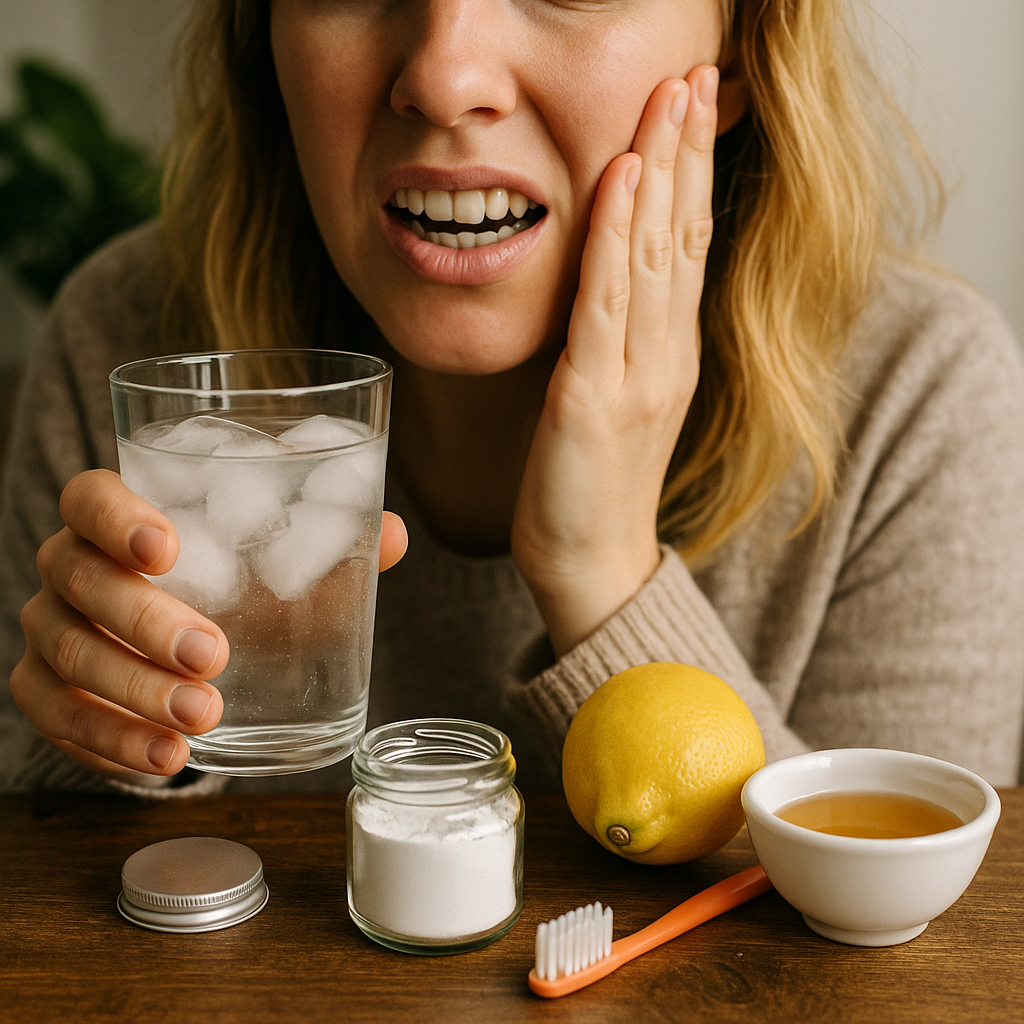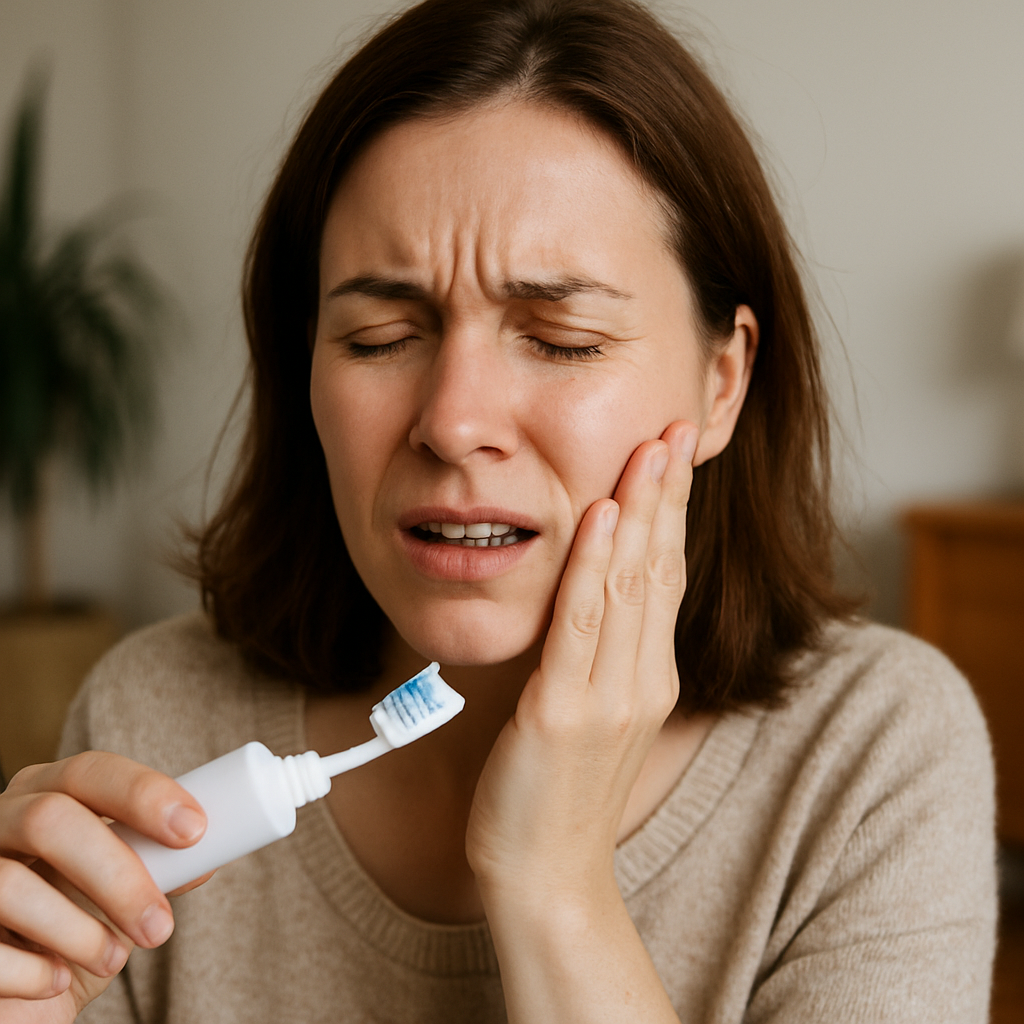Ask Ayurvedic doctor a question and get a consultation online on the problem of your concern in a free or paid mode. More than 2,000 experienced doctors work and wait for your questions on our site and help users to solve their health problems every day.
How to Treat Sensitive Teeth with Natural Remedies and Ayurvedic Tips

Struggling with sudden, sharp pain when sipping coffee or biting into ice cream? You're not alone. Millions face the discomfort of sensitive teeth every day. Whether it's a jolt from a cold drink or a sting from sweet treats, sensitive teeth can mess with your peace of mind — and your smile.
But here's the good news: You don’t have to suffer. If you’re wondering how to treat sensitive teeth or searching for effective sensitive teeth treatment that actually works, this guide’s for you. From trusted home remedies for sensitive teeth to ancient Ayurvedic secrets, we’ll explore the best ways to soothe tooth pain naturally. Ready to learn how to cure sensitive teeth and feel good again? Let’s dive in.

What Are the Symptoms of Sensitive Teeth?
Tooth sensitivity often sneaks up on you. One day, you're enjoying a smoothie. The next? Zing! A sharp pain shoots through your jaw. But it's not always that obvious.
Symptoms of sensitive teeth can include:
-
Sharp, sudden pain when eating hot, cold, sweet, or acidic foods.
-
Discomfort while brushing or flossing.
-
Sensitivity to cold air or even just breathing in through your mouth.
-
Mild pain that lingers after eating certain foods.
And let’s be real — it’s not just a minor annoyance. Sensitive teeth can affect your eating habits, mood, and even your sleep.
What Causes Sensitive Teeth?
Lots of things can wear down your enamel (that’s the protective outer layer of your teeth), or expose the dentin underneath. That’s what leads to sensitivity. Here’s what might be triggering your pain:
-
Aggressive brushing: Too much pressure or a hard-bristled brush = enamel damage.
-
Acidic foods and drinks: Think soda, citrus fruits, and vinegar-based dressings.
-
Teeth grinding (bruxism): You may not notice, but it wears teeth down over time.
-
Gum recession: Often linked to gum disease, it exposes the roots of your teeth.
-
Dental procedures: Whitening treatments or recent fillings can increase sensitivity temporarily.
Ayurvedic View on Tooth Sensitivity
Ayurveda, the ancient Indian system of natural healing, sees tooth sensitivity as a sign of imbalanced Vata dosha, which governs movement and dryness in the body. When Vata gets aggravated — often due to poor diet, stress, or lack of oral care — it can weaken the gums and nerves, making teeth more prone to pain.
Ayurvedic practitioners believe that tooth sensitivity stems from weakened Asthi dhatu (the tissue that includes bones and teeth). Strengthening this dhatu and calming Vata are key steps in sensitive teeth treatment through Ayurveda.
Don't wait or self medicate. Start chat with Doctor NOW
How to Treat Sensitive Teeth at Home
Before running to the dentist, there’s a lot you can do right from your kitchen or bathroom. Let’s look at how to treat sensitive teeth at home with remedies that are easy, affordable, and effective.
Best Home Remedies for Sensitive Teeth
You don’t need a lab to ease your dental pain — your pantry might be enough. Here are some proven sensitive teeth home remedy ideas:
-
Saltwater rinse: Natural antiseptic and helps reduce inflammation.
-
Clove oil: A time-tested home remedy for sensitive teeth; it numbs the nerves and fights bacteria.
-
Garlic paste: Yep, it stinks. But it contains allicin, which can help with sensitive teeth pain relief.
-
Warm turmeric water: Great for soothing gums and reducing pain.
-
Guava leaves: Chewing on them or using them as a mouth rinse is one of those grandma remedies that actually work.
Quick tip: Make sure you're not using these all at once. Try one or two consistently to see what works best for your body.
Ayurvedic Treatment for Sensitive Teeth
Ayurveda isn’t just about herbs and massages — it’s a complete system of healing that sees your oral health as connected to your overall wellness. If you’ve been wondering about treatment for sensitive teeth that doesn’t involve harsh chemicals or expensive procedures, Ayurvedic practices might be the answer.
Herbal Powders and Oils for Tooth Sensitivity
Ayurvedic tooth powders, also called dant manjan, have been used for centuries as a sensitive teeth remedy. They usually contain a mix of natural ingredients that clean, strengthen, and soothe:
-
Neem: Antibacterial and anti-inflammatory. Neem powder or twigs can help heal infected gums.
-
Licorice root: Known to protect the enamel and reduce gum bleeding.
-
Babool bark: Astringent properties tighten gums and reduce sensitivity.
-
Rock salt (sendha namak): Helps balance pH in the mouth and remove plaque.
Many people also swear by oil pulling — swishing sesame or coconut oil in the mouth for 10-15 minutes in the morning. It’s believed to pull toxins from the body, while also strengthening gums and reducing bacterial buildup.
One note of caution: If you're trying this for the first time, start slow. It can feel weird, but a lot of folks get used to it quickly and notice a difference in just a week or two.
Sensitive Teeth Remedies in Ayurveda
Here are some simple Ayurvedic suggestions that align well with how to fix sensitive teeth naturally:
-
Triphala rinse: Make a tea from this herbal blend (amla, haritaki, bibhitaki) and use it as a mouthwash.
-
Dashan Sanskar Churna: A powerful herbal blend used in traditional tooth powders for strengthening teeth.
-
Avoid very cold or very hot foods: This aggravates Vata and can worsen sensitivity.
-
Chew on guava or mango leaves: These are known to support oral tissues.
Ayurveda teaches that even your mental state affects oral health. So, manage stress, eat warm nourishing foods, and avoid excessive screen time — yes, seriously.

How to Care for Sensitive Teeth Daily
One of the most underrated things you can do is daily care. You’d be surprised how many people brush wrong or skip basic habits that can prevent tooth sensitivity in the first place.
Natural Toothpaste and Brushing Tips
Let’s talk toothpaste. If you're wondering what to do for sensitive teeth every day, it starts here:
-
Use a fluoride-free, herbal toothpaste designed for sensitivity (think neem, clove, or miswak based).
-
Brush with a soft-bristled toothbrush. Firm ones cause more harm than good.
-
Don’t brush right after meals — acidic foods soften enamel, and brushing right away can damage it further.
-
Be gentle. You're cleaning teeth, not sanding wood.
You can even try brushing with baking soda once a week. It helps balance the mouth’s pH and prevents decay, but don’t overdo it.
Foods to Avoid for Sensitive Teeth
Some foods are silent saboteurs. If you want to know how to care for sensitive teeth, start cutting back on:
-
Citrus fruits (lemons, oranges, grapefruits)
-
Soda and sports drinks (acidic and full of sugar)
-
Tomato-based sauces (hello, enamel erosion)
-
Super cold stuff (like ice water or frozen desserts)
Funny enough, even “healthy” snacks like pickles and kombucha can make things worse. So it’s not just about sweets or junk food — it’s about acids too.

How to Fix Sensitive Teeth with Modern Techniques
While natural and Ayurvedic remedies offer amazing support, sometimes you need a little modern help too. If the pain persists, it's important to know how to fix sensitive teeth using dental treatments that are proven and safe.
Here are a few clinical options that may be recommended by your dentist:
-
Desensitizing toothpaste: These products block pain signals from reaching the nerve. You’ll need to use them consistently to see results.
-
Fluoride treatments: In-office fluoride gels or varnishes can strengthen enamel and reduce pain.
-
Dental bonding or sealants: If enamel erosion or receding gums are the cause, your dentist might apply a special resin to cover the exposed areas.
-
Root canal: If nothing else works, and the sensitivity is severe due to nerve damage, this may be the final option. It sounds scary, but it can be a life-changer for chronic pain.
Just make sure you’re combining professional treatment with good at-home care. No dental fix can hold up if your daily habits aren't supporting it.
Conclusion
Tooth sensitivity can feel like a small problem—until it’s not. Whether it’s a sharp zing from your morning coffee or a dull ache that ruins dinner, it affects your life. But here's the thing: you don’t have to live with it. There are real answers out there.
From simple home remedies for sensitive teeth like saltwater rinses and clove oil, to Ayurvedic practices like oil pulling and herbal powders, to modern dental treatments — there are more options than ever. It’s all about finding what works for your body and your lifestyle.
Remember, the first step is knowing how to treat sensitive teeth at home, and then deciding when it’s time to get expert help. If you’ve read this far, you're already ahead of most people who just “tough it out.”
One last thing...
Start with one remedy or tip today. Just one. Maybe it’s switching your toothpaste, maybe trying an herbal rinse. Small steps = big change.
If you found this guide helpful, please share it with a friend who’s always complaining about their teeth hurting. You might just help them smile a little easier tomorrow.
FAQs
What is the best home remedy for sensitive teeth?
One of the most effective remedies is using clove oil. It acts as a natural analgesic and antibacterial, numbing the area and fighting infection. You can apply a drop directly to the sensitive area using a cotton swab. Other favorites include saltwater rinses, turmeric paste, and chewing on guava leaves.
How to cure sensitive teeth pain naturally?
Start by avoiding triggers like cold drinks or acidic foods. Then, try rinsing with warm saltwater, brushing with a natural toothpaste that includes neem or miswak, and using oil pulling with sesame oil. Combine these with a proper diet and gentle oral care for long-term results.
What to do for sensitive teeth while brushing?
-
Use a soft-bristled toothbrush and don’t scrub aggressively.
-
Avoid brushing immediately after acidic meals.
-
Use a sensitive-teeth toothpaste (natural or fluoride-based).
-
Try brushing with lukewarm water instead of cold — it's a game changer for some people.

